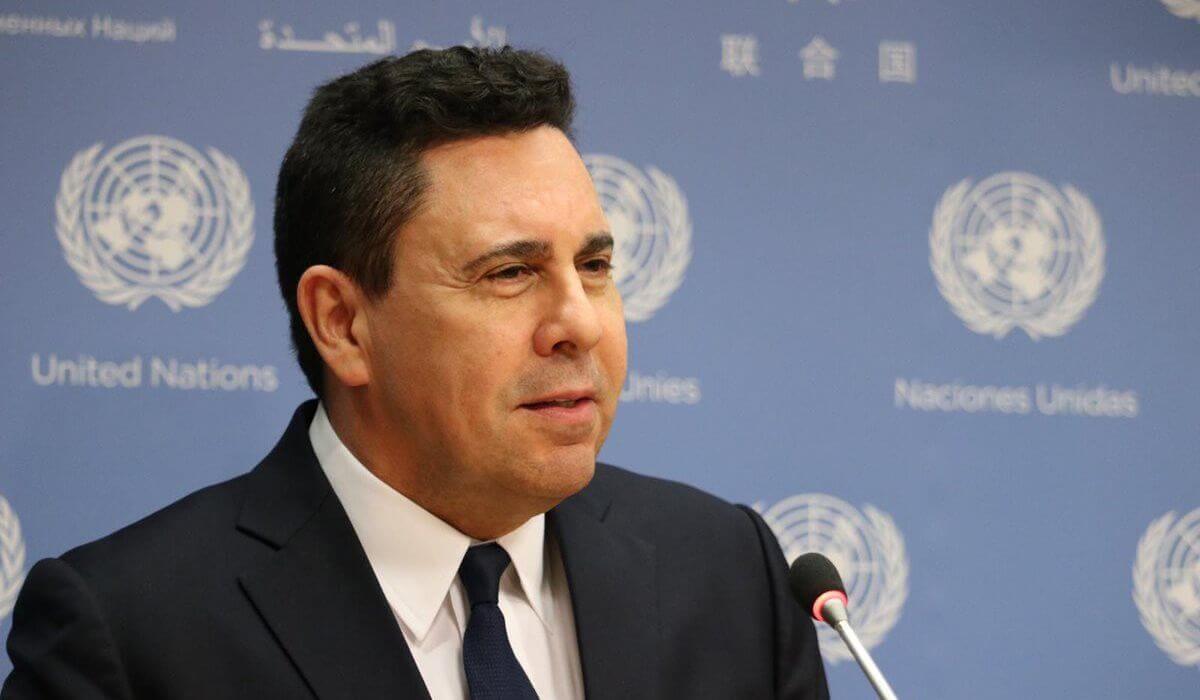Venezuela’s permanent representative to the United Nations (UN), Samuel Moncada, decried the sanctions by the United States, saying that its strategy of targeting vulnerable economies during a global pandemic is tantamount to “economic terrorism” and a “crime against humanity”.
Moncada tweeted on Tuesday, “Amid the universal pandemic, two of Trump’s henchmen flaunt their unique strategy to destroy the economies of Iran and Venezuela. It is a systematic plan to attack millions of lives by using economic terrorism. Here they confess their crime against humanity.” He attached a video of a discussion between US Special Representative for Venezuela Elliott Adams, US Special Representative for Iran Brian Hook, and Senior Investigator and Hudson Institute Nadia Schadlow.
En medio de la pandemia universal dos secuaces de Trump hacen alarde de su estrategia única para destruir las economías de Irán y Venezuela. Un plan sistemático para atentar contra millones de vidas usando el terrorismo económico.
— Samuel Moncada (@SMoncada_VEN) July 21, 2020
Aquí confiesan su crimen contra la humanidad. pic.twitter.com/VAARyOTmhq
In the video, Brian Hook says: “Elliott walked through the oil numbers in Venezuela and what he has done to deny Maduro what he needs to execute his missions. When President Trump got out of the Iran nuclear deal in May of 2018, Iran had about 3% of the world’s oil supply, and they were exporting 2.5 to 2.7 millions of oil per day. Being out of the deal allowed us to apply big pressure on Iran. Iran’s chief source of export revenue is oil, oil exports. We have collapsed Iran’s oil sector. That’s the price that it pays for being the principal driver of terrorism, and anti-Semitism, and instability in the Middle East. So in May of 2018, Iran was exporting 2.5 million barrels of oil per day. There was a Reuters story that came out in April that had their March 2020 numbers at 70,000 barrels. 2.5 million barrels to 70,000 barrels in about two years. This is the price the regime pays for behaving like an outlaw regime.”
In another tweet, Moncada once again took aim at Trump’s ‘minions’, saying that they are engaging in war propaganda that presents Venezuela as the US’ colony and Venezuelans as its slaves. He described the US’ actions as racism in the 21st century and their maximum pressure strategy as a ‘disinformation operation’. This allegation of “economic terrorism” has also been leveled by Iran’s Foreign Affairs Minister, Javad Zarif. In a separate tweet, Moncada also criticized the “sociopaths in the service of Trump”, saying that they fully “recognize that they are bringing economies down” and that this is a “deliberate act of terrorism, a crime of extermination, and a crime against humanity”.
Trump y sus secuaces ejecutan campañas de propaganda de guerra dentro de Venezuela. Parten del principio de que es su colonia y los venezolanos son sus esclavos.
— Samuel Moncada (@SMoncada_VEN) July 21, 2020
Es el racismo en pleno siglo XXI.
Aquí exponen su operación de desinformación. pic.twitter.com/l3sF647XtP
Last year, the US imposed sanctions on the Venezuelan state-owned oil company PDVSA as part of its ‘maximum pressure’ strategy to force a transition in power away from President Nicolás Maduro. The US recognizes opposition leader Juan Guaidó as the legitimate leader of the South American country.
Even during the ongoing crisis, the US has pressured multiple companies that certify vessels as “seaworthy” and several insurers to withdraw their services from Venezuelan tankers. The UK’s Lloyd’s Register (LR), a renowned ship classifier, for instance, is no longer serving eight tankers that were involved in trade with Venezuela. The German DNV GL Maritime has implemented similar changes.
Sociópatas al servicio de Trump reconocen que están destruyendo las economías de Irán y Venezuela. Es un acto deliberado de terrorismo, un crimen de exterminio y un crimen contra la humanidad. Aquí exponen el método para lograr la asfixia económica de millones de seres humanos. pic.twitter.com/TORojG3UGQ
— Samuel Moncada (@SMoncada_VEN) July 21, 2020
American sanctions are largely responsible for pushing Venezuela’s oil exports to their lowest levels in almost 80 years, which has left the already embattled and cash-strapped country struggling to meet the basic nutritional and medicinal needs of its population.
Iran, however, remains unperturbed, and sent five tankers of gasoline to Venezuela in May. In fact, Iran’s Foreign Ministry spokesman, Seyed Abbas Mousavi, said that cooperation between the two countries will continue or even increase, even in the face of sanctions. The US has reportedly sent navy warships to the Caribbean to, in Zarif’s words, “intervene and create disruption in [the] transfer of Iran’s fuel to Venezuela”. US sanctions caused Iran’s economy to contract by roughly 9.5% in 2019. This situation has only been worsened during the ongoing pandemic.
The risk of secondary sanctions is simply too great for some countries and companies. Panama and Liberia, for instance, have withdrawn registration for ships that violate US sanctions. Several companies in China and Russia have also put an end to oil trade with Venezuela. Likewise, Mexico, which earlier said it would sell gasoline to Venezuela as a humanitarian gesture, later froze the bank accounts of the Mexican companies and nationals involved in reselling Venezuelan crude.
Under the pressure of mounting US primary and secondary sanctions, the Bank of England’s refusal to release $1.9 billion in gold bars from its vaults to the ruling government, and now the UN report, the Venezuelan government finds itself more vulnerable than ever before.

